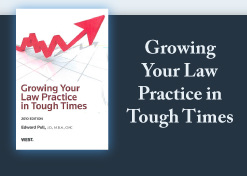|
To Engage or Disengage
Is Often the Question
It is a fundamental business and professional necessity that law firms have a signed engagement letter for a new client, stating each party's responsibilities for making the engagement a success. As we have often said, your firm will have an easier time meeting client expectations and collecting fees if you incorporate these into the engagement letter. The process aims to set forth the goals and expectations of the client and how they define the success of the engagement.
However, even a detailed engagement letter is not a guarantee against future problems. In large firms, when such a troubled relationship develops, the overall cost of a bad client relationship to each partner is minimal. Small firms see an immediate reduction of income, and for that reason often are tempted to accept or continue a worrisome relationship, with the misguided hope that things will improve and that a fee will materialize. Such hope is rarely justified.
That's when it's best to send either a non-engagement or dis-engagement letter, dependent on the time of decision, taking a firm and businesslike approach. A clear letter telling the client that your firm is breaking off the relationship before it goes further is practical and smart. There is no set template for what a non-engagement or dis-engagement letter should contain because the reasons for sending it will vary. But a prudent approach would be to state that the firm:
- Has reviewed the matter and working relationship with the client
- Has concluded that it is not possible to continue representation
- Recommends immediately contacting another lawyer for assistance (with suggested referral to the local bar association)
- Warns of any statutory limitations or benchmarks the recipient needs to know about to protect his/her interest/claim
- Is not expressing an opinion in a non-engagement letter about the merits of the matter as originally discussed
If, at the time of sending a non-engagement letter, there has been no actual legal work performed, it would be best not to charge for the time expended to that point. But if billable time is recorded before the firm concludes that going further is not wise, the dis-engagement letter should clearly inform the client that work is being stopped with adequate notice (for example, 60 days) and state, consistent with ABA's Rule of Professional Conduct 1.16 ("Declining or Terminating Representation"),
that the client must pay for work done to date. "Firing" a client should not be done lightly, but if the client does not comply with the engagement agreement, both parties will be better served by a separation.
|
|

Following the worst economic crisis since the Great
Depression, and facing a sea change in clients' demands
and expectations, law firms must respond and adapt
quickly and effectively. Law firms must choose the kind of
law practice they will be; the marketing and business
development tactics they will use; the overhead that is
critical to their functioning; how to price, bill and collect
for services; and how to manage the cash flow cycle.
Success lies in identifying and capturing the right kinds of
clients, providing the services those clients need in ways
that add value, and ensuring prompt payment and the
ability to grow profits. This book, based on the
experiences of Ed and his clients over 20 years of
coaching and consulting, provides the keys to
successfully thriving in the new era.
Now Available
Special New Release Price: $79
Regular Price: $120
Call or Order Online at:
1-800-837-5880
www.lawbiz.com





|

|
|
|

Personal Commentary
We're finally "on the road" again. Last week, we started north to Mammoth Lakes, CA. Then, last Sunday, we left Mammoth and drove to Carson City, NV, home of the Kit Carson trail and capital city of Nevada. Then we headed for Susanville for a couple of nights. Travel in the Airstream is a hoot; we have our home on wheels and can do just about anything we can do at home. Of course, when you have technology challenges (as we did on Saturday), it's not so easy. Redundancy is often a good thing. Because we have two computers with us, the fact that one "bombed" is inconvenient, but not catastrophic.
Look at your law office and ask yourself the same question: If something goes down, will I be o.k. with what is left? That's a key message in our book Disaster Preparedness & Recovery Planning for Law Firms.
Best wishes,
Ed Poll
lawbiz.com
lawbizblog.com
www.LawBizForum.com
800-837-5880
Please use the URL below to link to this issue:
www.lawbiz.com/nlimages/tip-7-6-10.html
|

|

What Readers Are Saying...
"No matter how you slice it, there is
no substitute for wisdom and
experience. Ed Poll has
demonstrated both in this eyeopening
book about the essential
elements of running a profitable law
practice. He provides practical
wisdom along with simple ways to
adopt and incorporate best practices
for each. After explaining the pros
and cons of every decision, he makes
recommendations and provides
useful guides disguised as key
principles. Buy the book so you too
can access Ed's wisdom and
experience. It's worth much more
than the investment."
STEWART L. LEVINE. ESQ.,
FOUNDER, RESOLUTIONWORKS
AUTHOR, GETTING TO RESOLUTION;
THE BOOK OF AGREEMENT AND
COLLABORATION 2.0
|

|

|






